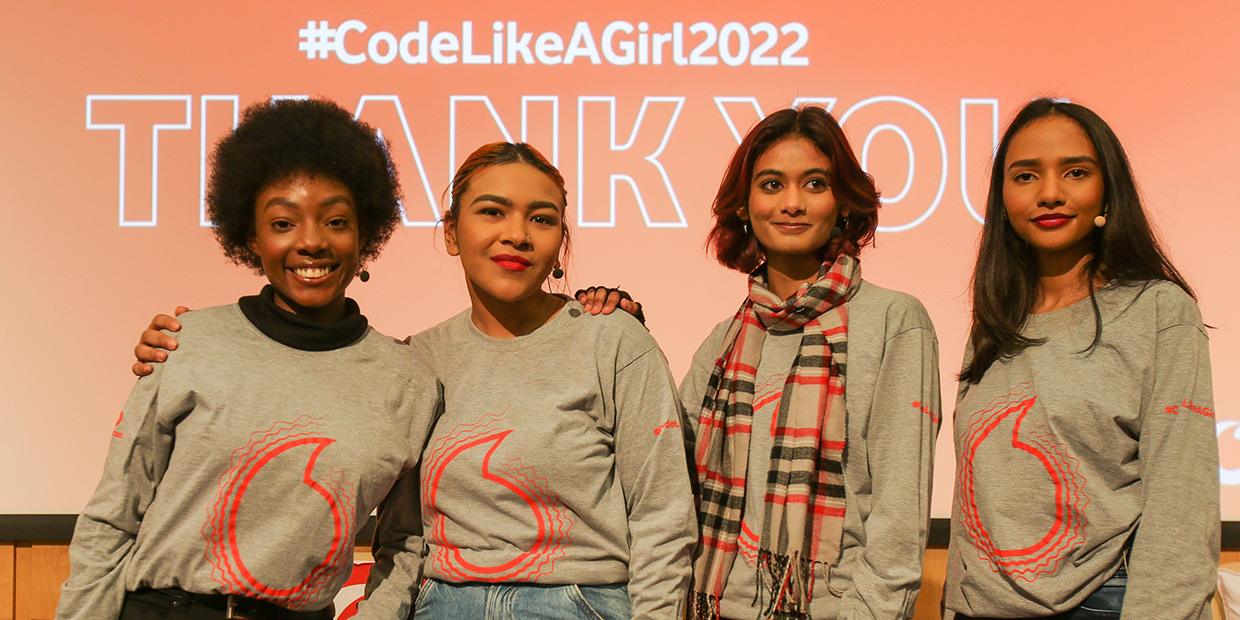
JOHANNESBURG - Since 2017, the Vodacom #CodeLikeAGirl initiative has gained immense popularity, inspiring young girls to venture into the fields of Science, Technology, Engineering, and Mathematics (STEM). More than 6 300 girls have benefitted from the programme to date, which teaches coding among other technology and life skills. Critically, by the end of the current financial year, the programme will have reached in excess of 10 000 underprivileged girls.
The #CodeLikeAGirl initiative contributes to building a more digital, inclusive, sustainable future on the continent while tackling low representation of women in STEM education through a structured educational programme that targets underprivileged girls. The purpose is to introduce underprivileged girls to coding basics and careers paths that are related to current and future skills gaps while also building a talent pipeline that speaks to our current and future skills needs.
In this past financial year alone, the programme has trained 2 451 girls in South Africa, the largest intake since #CodeLikeaGirl’s inception seven years ago. The aim is to reach another 3 000 girls this financial year through on-site and virtual bootcamps.
“We are extremely proud of the impact of #CodeLikeAGirl, which is popularising coding among girls and enabling diversity and inclusivity in STEM, which has been a traditionally male-dominated environment. Through our #CodeLikeAGirl programme, we are providing girls with an opportunity to grow through digital education and overcome barriers, such as gender stereotypes, preventing them from achieving their potential,” says Njabulo Mashigo, Human Resources Director, Vodacom South Africa.
The gender gap in STEM remains a pressing issue globally. According to the World Economic Forum, women constitute only 28.2% of all STEM workers compared to 47.3% in non-STEM sectors. The gap is even wider at a leadership level, with just over 10% of STEM leadership roles held by women. Reasons for this exclusion include gender bias, lack of career opportunities and shortage of visible role models to aspire to.
To address this disparity and encourage more female participation in STEM, #CodeLikeAGirl is for girls aged between 14 and 18 years old from all backgrounds, teaching them coding, robotics, and other ICT programs, including HTML, CSS, GitHub, Version control, and JavaScript. Additionally, participants are exposed to life skills development and authoritative mentors to nurture confidence and provide a support network while exploring possibilities in STEM. Since launching in South Africa, #CodeLikeAGirl has successfully expanded to Mozambique, Tanzania, the Democratic Republic of Congo and Lesotho.
Initially hosted at schools, the programme has transformed to offer both on-site and virtual bootcamps, enabling increased participation. The Virtual Bootcamp, which only requires access to a computer and internet connectivity, is currently live with over 300 girls registered on Vodacom’s Learner Management System. The On-site Bootcamp is scheduled to take place on 25-27 September 2024 at selected schools in South Africa.
The programme has also been revamped into an accredited five-level academy approach, with a certification that enables long-term career opportunities for beneficiaries while building a pipeline of talent for Vodacom. Girls who commit to all levels of the programme have better prospects of being chosen for Vodacom’s Mainstream Bursary Programme and transitioning into the company's early career initiatives, which can lead to permanent roles at the organisation.
“Often referred to as the jobs of the future, STEM is critical to drive innovation, social well-being, economic growth, and sustainable development. As a company within the STEM industry, Vodacom must do its part to dispel gender inequalities and foster a diverse talent pool through inclusive initiatives such as #CodeLikeAGirl. Empowering more women will help shape our future for the better,” concludes Mashigo.